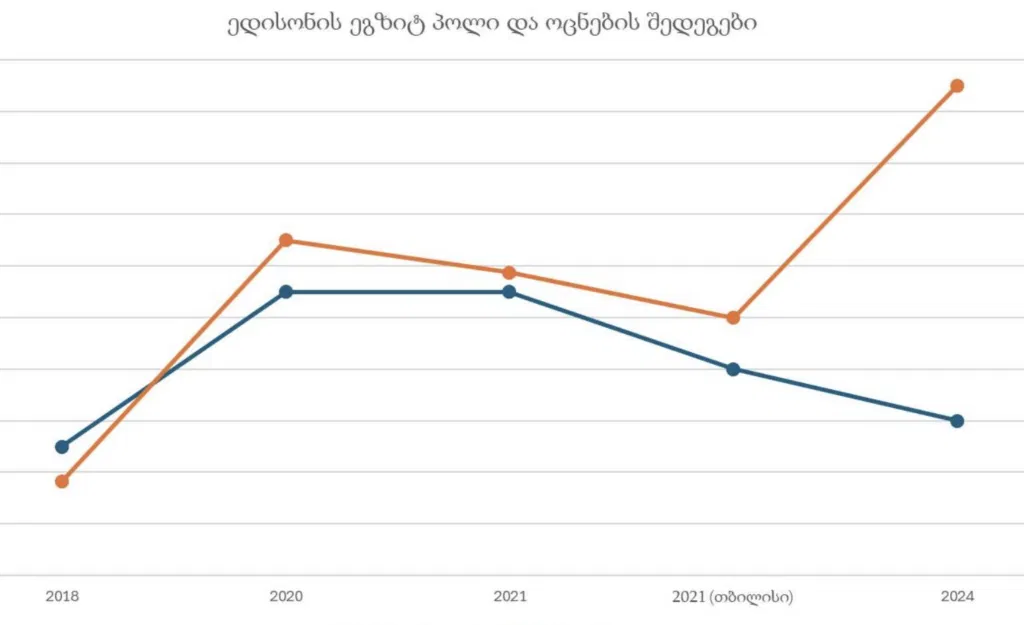Shalva Papuashvili, the Speaker of the Georgian Parliament, has defended the controversial victory of the ruling Georgian Dream Party in the October 26 elections. He denied allegations made by the opposition and observers that the election was rigged. He accused civil society and opposition forces of attempting to create unrest through disinformation campaigns at the October 28 briefing. He said that the opposition forces and civil society organizations did not want to accept the will of the people.
Edison Research Exit polls
Papuashvili said that the opposition and CSOs were spreading disinformation about the election results and violations. He referred in particular to a slide that was circulated on social networks showing the drastic difference between the official results of the Central Election Commission and the Edison Research exit polls for the elections held on October 26. This was in stark contrast with the previous years. He claimed that the Edison Research polls, sponsored and manipulated by Formula TV, a pro-opposition channel, were manipulated in order to “undermine, discredit, and undermine democratic elections.”
Edison Research and another opposition-leaning network polled Georgian Dream at 40,9% (Mtavari TV’s HarrisX polled GD at 42%). The four opposition coalitions were given a combined majority. Gorbi polls sponsored by pro-government Imedi showed a completely different picture. Georgian Dream received 56 percent of the votes. The official results state that GD received 53.93/%
He cited the International Society for Fair Elections and Democracy, a key observer in the area, which stated that its Parallel Vote Tabulation figures were in line the CEC figures. However, he added that they “cannot be used as a measurement of the validity of the electoral process, because fundamental violations both before and on the day of the election affected the free expression by the electorate.”
The Speaker dismissed these arguments. The Speaker dismissed these arguments.
Electronic Technologies
Papuashvili stated that concerns about the use of electronic technology to manipulate votes are false. He was referring to the allegations made by the opposition, as well as observers, of duplicate voter lists and suspicions that technology was biased towards the ruling party. He denied them all.
In this regard, he accused Salome Zurabishvili spreading disinformation about electronic technology.
He said an American company (which he did not identify) had conducted a preliminary review of the technologies. “When you’re tasked with disrupting a country, you just make all kinds of lies,” said he.
Mobile Ballot Voters
Speaker Papuashvili rebutted the concerns raised by Nika Melia, opposition leader and co-chairperson of the Ahali Party, that the large number registered as mobile voters raises questions.
Melia said the fact that over 60,000 people voted using mobile voters in total was too many. She cited a figure for a small town such as Tsalenjikha, where 700 people voted that way.
Mobile voters vote from home because of physical health issues. The mobile ballot box is carried by several members of the commission to their homes. This is thought to make manipulation easier.
Papuashvili claimed that the number mobile voters in previous election was even higher than this year’s elections on October 26, suggesting that 60,000 mobile voters were not too many.
Violence Cases
Speaker Papuashvili played down the violence on election day, saying that there were “only a few isolated incidents,” despite numerous media reports of large scale violations from the beginning of the opening polling stations.
He said that there were only 10 cases of violence in polling stations, and three against the media. Papuashvili based his figures on the initial media reports. Media reports suggest a higher number of violent incidents, but it is important to note that they could not cover every polling station in the country.
Pre-Election Environment
Papuashvili claimed that the pre-election environment was “peaceful”, “competitive” and “competitive”, citing the OSCE/ODIHR Interim Report. He omitted some parts of the OSCE/ODIHR interim report that discussed the problems in the preelection environment.
The OSCE/ODIHR interim report of October 12 on the pre-election climate in Georgia stated that the elections are taking place “in the context of entrenched polarization and political tensions, opposition mistrust of state institutions, and concerns over protection of the right of association and expression.”
Opposition vs. People
Papuashvili, on top of all of his points, concluded by claiming the opposition did not reflect the will the people.
“They [the Georgian people] have seen that [the opposition] does not carry the interest of the Georgians, but goes overseas and plans its agenda to favor them [the foreigners],” said he, claiming further that the opposition didn’t have the pre-election campaigns.
He said that the total number opposition votes decreased compared to the previous elections while the GD’s supporters increased. “Now, we see their desperate campaign…the hate campaign,” Papuashvili stated.
“I call on all to stop the disinformation campaign… There have been democratic elections in Georgia. These were free elections where the Georgian people gave a verdict. Everyone should get used to that verdict,” he concluded.
Read More @ civil.ge













